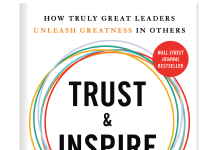
We all know that the brand with the best customer experience (CX) wins. And most of us know that the best customer experiences are delivered by empowered frontline workers. Nevertheless, businesses struggle to empower their frontline staff; many experience burnout, disconnection, and low morale. Around 82 percent of workers want recognition for their work – but very few, if any, get the acknowledgment they crave. Happier workers are also more productive, just as a well-coached staff is more motivated, engaged, and willing to take responsibility for their actions and output.
Businesses don’t need to reinvent the wheel – they merely need to observe some of the fastest-growing experience brands in the world, like Airbnb, Southwest, and Uber. These companies outpace their competitors because they understand that great CX comes from investing in the experience of their frontline staff. They went global by focusing on daily habits that motivate frontline employees to deliver memorable CX. Their same habits can get segmented into seven interconnected practices that, when applied consistently, enable frontline workers to deliver exceptional CX – the Seven Daily Habits of Empowered Frontline Teams.
Set Service Standards and Gather Feedback Daily
Shockingly, yet unsurprisingly, research from Gallup discovered that only 26 percent of U.S. employees feel their organizations keep their promises to customers. Similarly, Gallup found that only half of the surveyed workers know what their work expects of them. For staff and customers, businesses must set service standards so everyone knows what to expect. These standards shouldn’t be too wordy or use complex business jargon and acronyms. And they need to be easily accessible by staff and customers alike – one chain of urgent care medical centers displays their service standards in a colorful and vibrant fronts on the wall of every clinic.
Now that frontline employees have a map to follow; it’s necessary to give them a compass or a means by which they can assess their abilities and discover shortcomings. Enterprises need to gather customer feedback daily, filter it based on relevance, and then provide it to their staff – otherwise, they’ll never know if they need to keep doing what they’re doing or correct course. It is pertinent that the feedback gets to the employee in real time. Uber, for instance, integrates feedback into the application its workers use daily; by simply glancing at the app, drivers get specific help to improve and maintain company standards.
Recognize Achievement, Personalize Coaching, and Prioritize Incremental Improvement
Frontline staff desire recognition – it’s a science called positive psychology. Since the pandemic, an overwhelming 91 percent of employees felt that a robust company culture of praise made them want to stay with the business. Recognition is so powerful that companies who habitually acknowledge workers are three times more likely to have higher employee retention, not to mention better engagement and productivity. However, if appreciation doesn’t come regularly, its positive effects wear off quickly, so it must be routine. Yet despite the benefits, managers shouldn’t hand out praise without cause – employees still have to earn it.
With service standards set and customer feedback collected daily, managers can determine the appropriate areas of development based on customer feedback. Managers should target each frontline worker’s specific opportunities for improvement. It is paramount that coaching gets personalized to each individual, and by utilizing technology, managers can automate check-ins and tips.
When coaching for improvement, leaders should focus on one change at a time. Accomplishing something, even minor, helps frontline staff feel good, as it releases dopamine throughout the body and motivates them to do more. Likewise, small accomplishments compound into massive victories and achievements over time.
Share Metrics and Listen to the Frontline
Organizations can further ensure an optimal CX by connecting their frontline to their bottom line. While catchy, this statement means that teams should have access to critical metrics like generated revenue, deals closed, five-star reviews, etc. Providing staff with targets will gain a line of sight between their role and the overall company’s success. Suddenly, their mundane tasks will have a greater meaning and fit within a more giant puzzle. Businesses must also show frontline workers how their contribution directly impacts the bottom line.
The last habit is to listen to frontline staff. Companies can tap into valuable knowledge and experience gathered from countless customer interactions. There is a high probability that a frontline employee has a unique solution to a problem that higher-ups in a boardroom haven’t figured out yet. Moreover, enterprises can unmute their workers through technology, allowing them to share ideas and express concerns.
Reduce Manual Effort Through the Right Platforms
It can be challenging for frontline managers to complete all these tasks daily for each employee – especially if they have a large, distributed team. Thankfully, there is a new breed of the platform (we call it Frontline Success) that handles the heavy lifting of effectively and automatically recognizing, empowering, and coaching frontline workers. While many platforms handle portions of the employee and customer experience, many get bogged down by implementation issues and endless analysis techniques that prevent businesses from successfully implementing all of these daily habits. Customer Experience leaders must look for a platform that helps their teams implement these seven daily habits without adding more work to their already overloaded plates.




